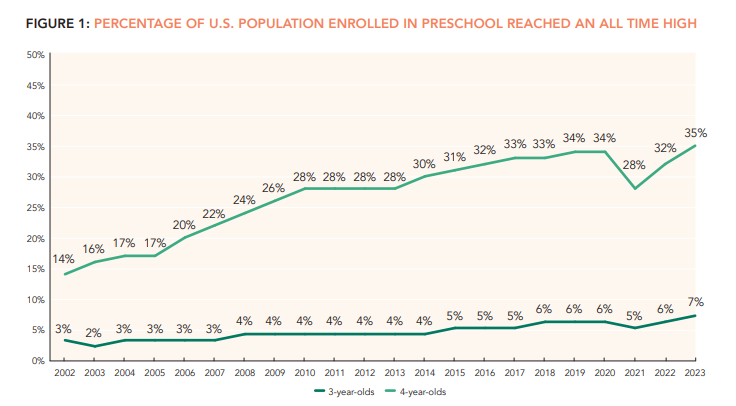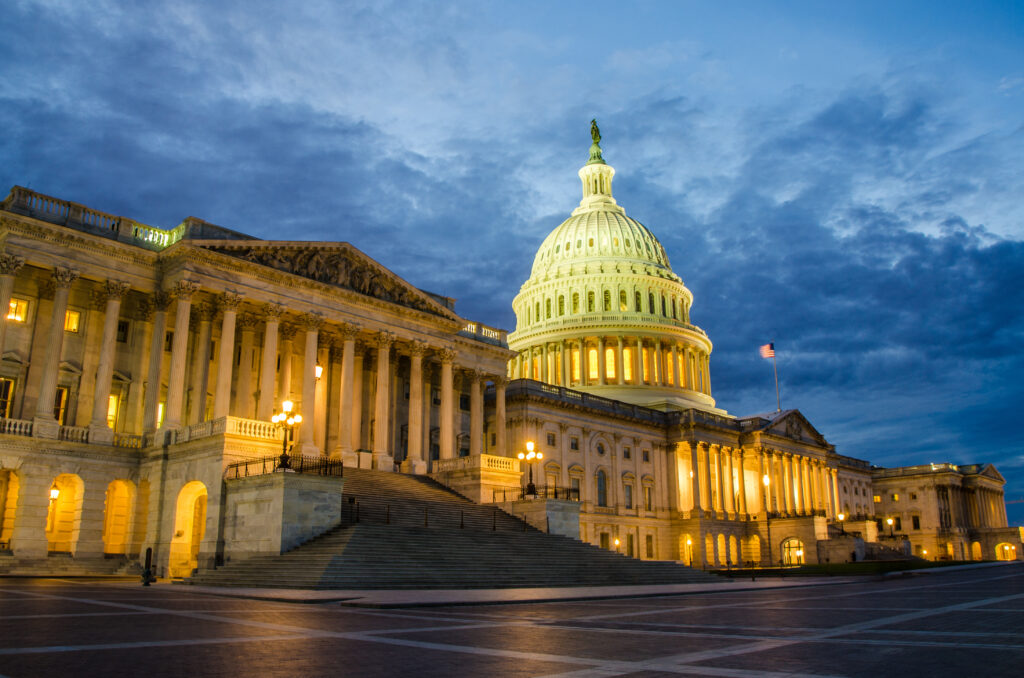NIEER’s Annual Report Shows Uneven Progress for State Preschool

The National Institute for Early Education Research (NIEER) recently released the 2023 State of the Preschool Yearbook, their annual report detailing state preschool policies. This edition provides comprehensive data on child enrollment, state spending, and quality standards for the 2022-2023 school year. This is a critical moment for preschool in America, as states have progressed unevenly coming out of the COVID-19 pandemic. While many have enacted stronger policies and made investments to ensure equitable and affordable access for children, a handful of states still do not even have publicly funded preschool programs.
NIEER’s Yearbook has been a crucial data source for the field for more than 20 years. For the first time, the data is now available in NIEER’s new data explorer, in addition to the full report and state profile pages. This new tool allows readers to compare data across states and over multiple years.
KEY TAKEAWAYS FROM THE REPORT:
Enrollment
- About 1.63 million children attended state-funded preschool during the 2022-2023 school year. Enrollment increased in all but six states.
- The percentage of three- and four-year-olds enrolled in preschool reached an all-time high.
- States served 35% of four-year-olds and 7% of three-year-olds.
- This is a 7% increase from the 2021-2022 school year.
- The total number of children served remained below pre-pandemic levels. The high percentages are partially due to a decline in the population of young children.

- NIEER found more states than ever are working on implementing universal preschool access.
- In six states (Florida, Iowa, Oklahoma, Vermont, West Virginia, and Wisconsin) and D.C., universal preschool for four-year-olds is already a reality.
- Vermont and D.C. provide universal access for three-year-olds as well.
- Georgia, Illinois, Maine, and New York are currently implementing universal preschool policies.
- California, Colorado, Hawaii, and New Mexico have recently passed laws to implement universal preschool.
- Michigan and New Jersey governors support universal preschool and are working to expand access.
Funding
- State spending on preschool reached an all-time high and increased by a larger percentage than child enrollment.
- States spent $11.73 billion, which included COVID-19 relief dollars, on state preschool in 2022-2023. This is an increase of $1.17 billion (11%) from 2021-2022 when adjusting for inflation.
- State spending per child averaged $7,277, higher than pre-pandemic numbers but not considerably more than 21 years ago. NIEER estimates that combined with federal and local funding, per child spending averaged $11,300.
- While this is an important improvement, states are still spending less than it costs to provide a high-quality full-school day program and less than what most spend per child on K-12 education.
Quality
- Quality standards continue to vary among states. Only five states met all ten of NIEER’s quality standards benchmarks (Alabama, Hawaii, Michigan, Mississippi, and Rhode Island).
- 37% of children were in state-funded preschool programs that met less than half of NIEER’s quality standards. Only 16% of children were in programs that meet nine or ten of these benchmarks. This is an increase from only 11% of children last year..
- NIEER highlights a concern regarding lead teacher quality standards. One of NIEER’s quality benchmarks is that state pre-K programs require lead teachers to have a bachelor’s degree. NIEER found that more and more states are allowing programs to waive this requirement in response to the teacher shortage.
NIEER emphasizes the progress made over the past twenty years. Enrollment and spending (adjusting for inflation) have more than doubled since 2002. Twenty years ago, no states met the minimum benchmarks for program quality standards, and today a handful do. Even though substantial progress has been made, work must be done to ensure every child has equitable access to high-quality preschool.
Past the height of the challenges of the pandemic, NIEER urges states to think strategically about how they want to proceed with their preschool programs. The report offers important policy choices for states to consider, including how to support program quality, how to recruit and retain effective pre-K teachers, how to prioritize access (universal vs. income-based, expanding to 3-year-olds, etc.), where to offer preschool, and more. While states have much to consider, NIEER also urges the federal government to become more involved and provide more funding that supports and incentivizes more children to gain access to high-quality, affordable, and accessible early childhood education.
Subscribe to FFYF First Look
Every morning, FFYF reports on the latest child care & early learning news from across the country. Subscribe and take 5 minutes to know what's happening in early childhood education.



